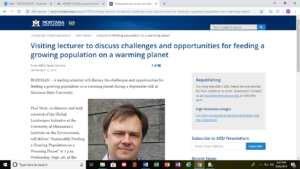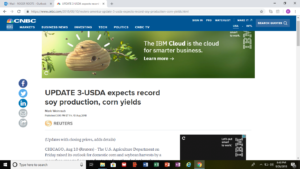by Dr. Roger I. Roots, founder, Lysander Spooner University
On Wednesday, Sept. 26, 2018, I happened to read an advertisement in the Bozeman Daily Chronicle about a visiting expert professor who would be giving a lecture that very evening. The title of the lecture was: “Visiting lecturer to discuss challenges and opportunities for feeding a growing population on a warming planet.”
I ended up attending the lecture, which was well attended. The visiting professor, Paul West, co-director and lead scientist of the Global Landscapes Initiative at the University of Minnesota’s Institute on the Environment, gave a nice talk on global trends in agriculture, the release of greenhouse gasses from different crops, and prospects for the future.
I’m sure his research is well-funded by government research grants–and his approach is to call for more central planning of the world’s agricultural development (of course).
At the end of the lecture I asked him the question: what major world crop is declining due to climate change? (I knew that almost all global crops are seeing INCREASING, NOT DECREASING yields despite recurring claims that global warming is about to cause global crop failures.)
Dr. West had difficulty with the question. He asked back: “Do you mean ‘already.’?” I said yes. “Already.”
He fidgeted a bit; and the audience could sense the question was a sensitive one.
Then Dr. West responded that there was a pending (apparently unpublished, or about-to-be-published) paper somewhere that suggests that “maize and soy” yields are declining due to “climate change.”
Well at least I got an answer.
Immediately afterward, I googled around a bit for crop-yield data on maize and soy. It turns out that both soy and “maize” (corn) yileds are predicted to be AT RECORD LEVELS this year (at least in the U.S. which is the major soy and corn producer). See here.
Maybe the now-secret, unpublished paper will shed more light on the subject.
STAY TUNED!



